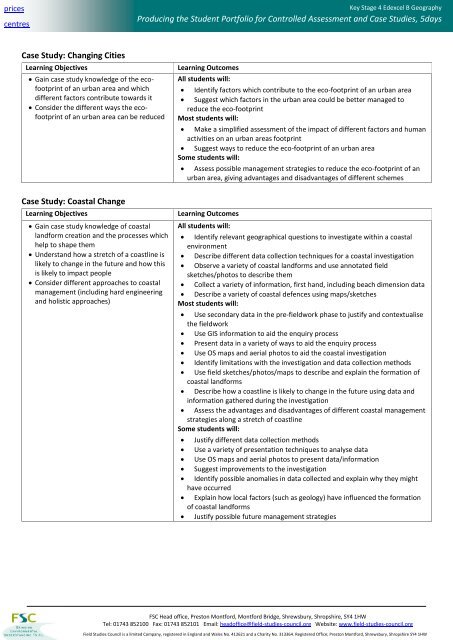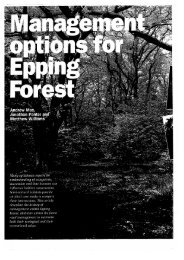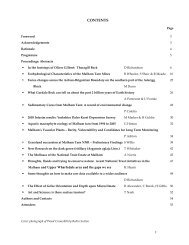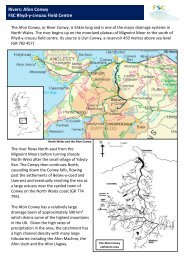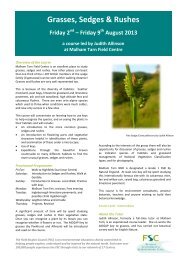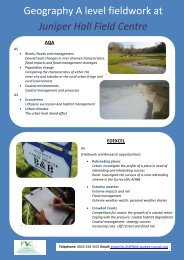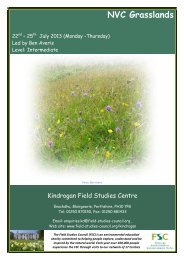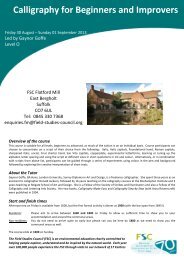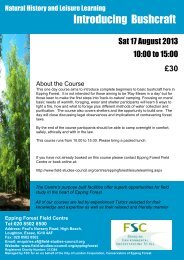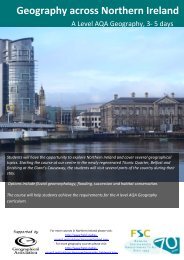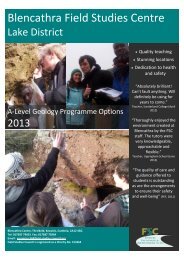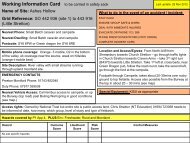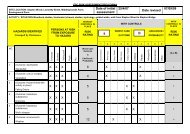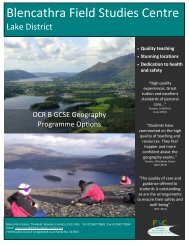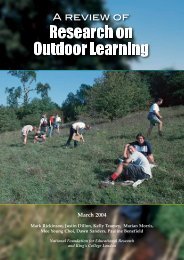Producing the Student Portfolio for Controlled Assessment and Case ...
Producing the Student Portfolio for Controlled Assessment and Case ...
Producing the Student Portfolio for Controlled Assessment and Case ...
You also want an ePaper? Increase the reach of your titles
YUMPU automatically turns print PDFs into web optimized ePapers that Google loves.
prices<br />
centres<br />
<strong>Case</strong> Study: Changing Cities<br />
Learning Objectives Learning Outcomes<br />
� Gain case study knowledge of <strong>the</strong> ecofootprint<br />
of an urban area <strong>and</strong> which<br />
different factors contribute towards it<br />
� Consider <strong>the</strong> different ways <strong>the</strong> ecofootprint<br />
of an urban area can be reduced<br />
<strong>Case</strong> Study: Coastal Change<br />
Key Stage 4 Edexcel B Geography<br />
<strong>Producing</strong> <strong>the</strong> <strong>Student</strong> <strong>Portfolio</strong> <strong>for</strong> <strong>Controlled</strong> <strong>Assessment</strong> <strong>and</strong> <strong>Case</strong> Studies, 5days<br />
All students will:<br />
Learning Objectives Learning Outcomes<br />
� Gain case study knowledge of coastal<br />
l<strong>and</strong><strong>for</strong>m creation <strong>and</strong> <strong>the</strong> processes which<br />
help to shape <strong>the</strong>m<br />
� Underst<strong>and</strong> how a stretch of a coastline is<br />
likely to change in <strong>the</strong> future <strong>and</strong> how this<br />
is likely to impact people<br />
� Consider different approaches to coastal<br />
management (including hard engineering<br />
<strong>and</strong> holistic approaches)<br />
� Identify factors which contribute to <strong>the</strong> eco-footprint of an urban area<br />
� Suggest which factors in <strong>the</strong> urban area could be better managed to<br />
reduce <strong>the</strong> eco-footprint<br />
Most students will:<br />
� Make a simplified assessment of <strong>the</strong> impact of different factors <strong>and</strong> human<br />
activities on an urban areas footprint<br />
� Suggest ways to reduce <strong>the</strong> eco-footprint of an urban area<br />
Some students will:<br />
� Assess possible management strategies to reduce <strong>the</strong> eco-footprint of an<br />
urban area, giving advantages <strong>and</strong> disadvantages of different schemes<br />
All students will:<br />
� Identify relevant geographical questions to investigate within a coastal<br />
environment<br />
� Describe different data collection techniques <strong>for</strong> a coastal investigation<br />
� Observe a variety of coastal l<strong>and</strong><strong>for</strong>ms <strong>and</strong> use annotated field<br />
sketches/photos to describe <strong>the</strong>m<br />
� Collect a variety of in<strong>for</strong>mation, first h<strong>and</strong>, including beach dimension data<br />
� Describe a variety of coastal defences using maps/sketches<br />
Most students will:<br />
� Use secondary data in <strong>the</strong> pre-fieldwork phase to justify <strong>and</strong> contextualise<br />
<strong>the</strong> fieldwork<br />
� Use GIS in<strong>for</strong>mation to aid <strong>the</strong> enquiry process<br />
� Present data in a variety of ways to aid <strong>the</strong> enquiry process<br />
� Use OS maps <strong>and</strong> aerial photos to aid <strong>the</strong> coastal investigation<br />
� Identify limitations with <strong>the</strong> investigation <strong>and</strong> data collection methods<br />
� Use field sketches/photos/maps to describe <strong>and</strong> explain <strong>the</strong> <strong>for</strong>mation of<br />
coastal l<strong>and</strong><strong>for</strong>ms<br />
� Describe how a coastline is likely to change in <strong>the</strong> future using data <strong>and</strong><br />
in<strong>for</strong>mation ga<strong>the</strong>red during <strong>the</strong> investigation<br />
� Assess <strong>the</strong> advantages <strong>and</strong> disadvantages of different coastal management<br />
strategies along a stretch of coastline<br />
Some students will:<br />
� Justify different data collection methods<br />
� Use a variety of presentation techniques to analyse data<br />
� Use OS maps <strong>and</strong> aerial photos to present data/in<strong>for</strong>mation<br />
� Suggest improvements to <strong>the</strong> investigation<br />
� Identify possible anomalies in data collected <strong>and</strong> explain why <strong>the</strong>y might<br />
have occurred<br />
� Explain how local factors (such as geology) have influenced <strong>the</strong> <strong>for</strong>mation<br />
of coastal l<strong>and</strong><strong>for</strong>ms<br />
� Justify possible future management strategies<br />
FSC Head office, Preston Mont<strong>for</strong>d, Mont<strong>for</strong>d Bridge, Shrewsbury, Shropshire, SY4 1HW<br />
Tel: 01743 852100 Fax: 01743 852101 Email: headoffice@field-studies-council.org Website: www.field-studies-council.org<br />
Field Studies Council is a limited Company, registered in Engl<strong>and</strong> <strong>and</strong> Wales No. 412621 <strong>and</strong> a Charity No. 313364. Registered Office; Preston Mont<strong>for</strong>d, Shrewsbury, Shropshire SY4 1HW


